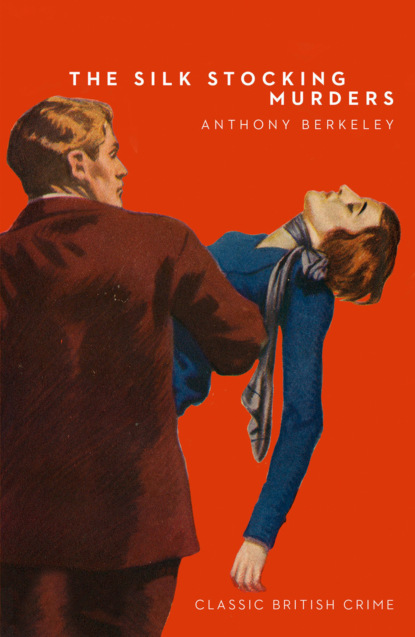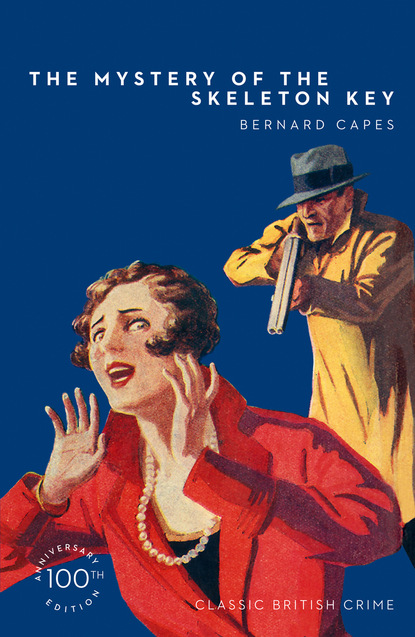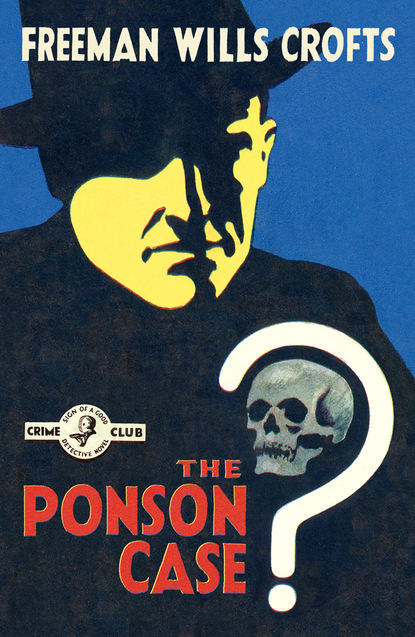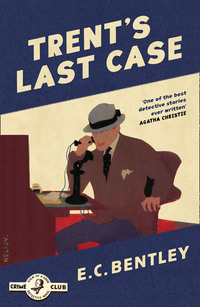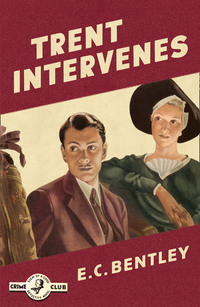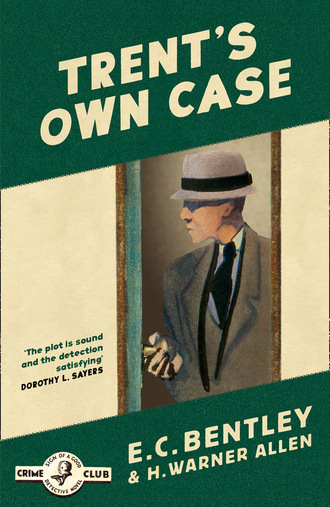
Полная версия
Trent’s Own Case
‘Oh! That is kind of you, Philip. My favourite flower! And exactly what was wanted for the finishing touch to this stage of the adventure. My dear, you cannot imagine how I feel about it. Everything is so different from what it used to be—I mean everything in the way of getting abroad.’ Aunt Judith certainly appeared to be enjoying to the full the excitement that she had tasted in anticipation. Her eyes were bright, and her cheek had an unaccustomed flush.
Trent came at once to the point that was uppermost in his mind. ‘You will be glad to hear that it is all settled about Eunice. I saw Randolph this evening, as I had arranged, and I made quite sure that he won’t trouble her again. You know, Aunt Ju, I could see you didn’t feel quite confident about it when I told you I knew how to get a really binding promise out of the old man. Well, that is what I’ve done; you can set your mind at rest. I couldn’t explain to you how I was going to manage it, and I can’t now. I told him, you see, that I would keep quiet about it, as long as he lived at least; it was a bargain. But it’s all right.’
‘It is such a relief to know that, Philip.’ Miss Yates buried her nose in the carnations gratefully. ‘You are quite right, I couldn’t help being a little worried until it was quite certain.’
‘All the same,’ Trent went on, ‘it looks as if I am booked for a bit of a row with Eunice about it. It seems you wrote to her saying you had told me what had been going on, and you were letting me loose on the old man. She doesn’t like it. I got a note from her yesterday, and it wasn’t a nice note, though knowing what she is it didn’t altogether surprise me.’
There was a slight but perceptible elevation of Miss Yates’s chin. ‘What do you mean, Phil, by knowing what she is?’
‘Now don’t get up in arms, Aunt Ju. Of course I didn’t mean …’
‘My dear boy, I am not up in arms, but …’
‘Well, call it a partial mobilization then. You can’t bear to hear a hint of criticism of Eunice, everybody knows that. It’s how I feel myself about her, for that matter. But there’s no harm in saying I wasn’t surprised to be told that her private affairs were none of my damned business, and that she would be obliged if I would keep my nose out of them, and that she was perfectly capable of looking after herself … with more to the same effect.’
Miss Yates, smiling, laid a neatly gloved hand on his arm. ‘If that’s all you mean, Phil, by saying you know what she is, why of course you do … it’s common knowledge that Eunice has a good allowance of spirit. I dare say you have heard things in that tone of voice from her before. So have I, sometimes. So has your wife, though she is a much older friend than you are. None of us take it too tragically, I am sure. We all know …’
‘What she is. Wasn’t that what you were going to say, Aunt Ju? So there we are again at the starting-point of our misunderstanding, and we find ourselves in complete agreement—just like foreign ministers in an official communiqué.’
‘Yes; only we really are, my dear. Now I will confess to you, Phil, that I thought it quite possible she might write you something like that, and I hoped that you would disregard it. She has always insisted on managing her own life just as she likes, and making a hash of it in any way she chooses—which she has done, goodness knows.’
Trent nodded. ‘Goodness does know, indeed. Speaking of that,’ he added, ‘I saw Wetherill for a moment just before I started to come here. He was looking extremely well, I’m sorry to say. I never set eyes on that fellow without wanting to murder him.’
‘I wish you would, I’m sure,’ Miss Yates said with intense feeling. ‘Though there’s no way of doing it that wouldn’t be too good for him.’
‘Yes; and another thing against it is that it’s a game two can play at. He could give me points at it. Wetherill is not the convenient sort of villain who will always take a licking from the hero without doing anything about it. He is fit to take care of himself in any sort of a scrap, he’s afraid of nobody, and he loves a row. It’s a fact, you know, that he killed a man in a duel at La Spezia, after being wounded twice.’
‘I expect he cheated,’ Miss Yates said. ‘I never cared much for La Spezia, and now I shall like it less. Wetherill ought to have lived in Italy of the fifteenth century, along with the Sforzas and the other Renaissance wild animals.’
‘So he ought,’ Trent agreed. ‘But he has always left undone the things that he ought to have done.’
‘She has had nothing to do with him for some time now—she told me so. But that has happened before, and it never lasts. I do wish,’ Miss Yates said fretfully, ‘Eunice could have managed to take that sort of interest in any other man. There were enough for her to choose from, goodness knows! and a number of them very decent fellows, I have no doubt. There was that young doctor friend of yours, I forget his name—’
‘Bryan Fairman, you mean.’
‘Yes. I never met him, but I always thought it would be nice for her to be married to a friend of yours and Mabel’s, and I knew from the way you both used to speak of him that he was the right sort. What makes it all the more irritating is, she has always been very fond of him in a way.’
‘I don’t know,’ Trent said, ‘how many times she has refused to marry him—both of them have lost count, I should think—but I dare say she always did it in the most affectionate terms. Poor Aunt Ju! You never realized what you were letting yourself in for when you decided to become a mother to a girl like Eunice Faviell.’
Miss Yates smiled whimsically. ‘When I decided! It was Eunice who made up her mind to adopt me—you know it was. Why she did, I don’t suppose she knows herself.’ Miss Yates turned the discussion to her plans of travel, and to the changes wrought in Rome since the eighteen nineties. Trent’s own arrangements for the immediate future came under review. Early next day he was going down to Glasminster to attend the wedding of Julian Pickett. Perhaps Aunt Judith remembered Julian. Of course Aunt Judith did. He was the young fellow who had had a limp ever since a tiger bit him somewhere in the Himalayas.
‘In the gluteus maximus,’ Trent murmured.
‘I knew it was somewhere like that,’ Aunt Judith said. ‘Yes; and the day you brought him to see me he rolled up a sheet of music and made a noise like a panther through it, so that Elizabeth dropped the tea-tray in the pantry, and had to be given sal volatile.’
At 8:15 Miss Yates was installed in her place, continuing the conversation through the open window. At 8:19¾ a man carrying a kit-bag hurried past the barrier. He fled to the first-class Pullman, and leapt in just as the train began to move. He was standing in the doorway, with the attendant hauling in his bag, when he chanced to turn and look Trent straight in the face.
Trent, whose casual glance had seen in him only an unknown individual in a big coat over brown tweeds, and a soft hat well pulled down, uttered an exclamation. ‘Bryan! By Jove, you nearly missed it!’
‘Phil! You here!’ With a wild gesture the man leaned from the receding coach. ‘Why the devil …’ The rest of his shout was drowned in the rumble as the train gathered speed. Trent, in his astonishment, barely remembered to reply to his aunt’s wave from the window.
What could be the meaning of Bryan Fairman’s state of agitation? Why had his friend, usually so strictly self-controlled, looked and acted like a demoralized and desperate man?
CHAPTER II
A LITTLE SHEET OF PAPER
MISS Yates, for her part, had not perceived this brief scene of recognition, and she applied herself now, very contentedly, to the taking of things as they came. She observed that, as the train drew out of the station and gathered speed, there was a change in the atmosphere of the carriage. Passengers who had been painfully absorbed by long-drawn-out farewells pulled themselves together. They became more jaunty and less self-conscious. They were on the threshold of something like another existence, in which for a time they would be freed from the conventions of their environment and from neighbourly inquisition. Consciously or unconsciously, they hoped to be really rather more themselves. Moreover, they were southward bound, leaving fog and drizzle behind them. There was the sense of relief which doctors have in mind when they use the tactful expression ‘change of scene.’
With a smile, Miss Yates settled herself in her place and looked round the carriage. There was a slight touch of luxury about it all which she found extremely soothing. The menu did not look exceedingly inviting, but to her there was a certain sense of adventure about dining in the train. And the man was so delightfully polite, particularly after she had ordered herself half a bottle of burgundy.
As dinner was served, she began unobtrusively to take note of her fellow-travellers, and build up for herself an imaginary picture of their lives. For Miss Yates had a keen curiosity about all strangers with whom she came in contact, and it amused her to fit each of them with a personal history. Sometimes she enjoyed the additional pleasure of contrasting her guesses with the later-appearing facts.
She had little hesitation in measuring up the tall, straight-backed, distinguished man, carefully dressed and with well-tended grey moustache, who sat nearest to her, reading a magazine. Not quite military, she decided; a more thoughtful type. Something diplomatic, undoubtedly; perhaps a newly-appointed ambassador or minister. Her conjecture would not have pleased the object of it, who prided himself on looking every inch a soldier. He was in fact a very eminent professor of history, on his way to Tunis, where he hoped to establish new facts about the battle of Thapsus that would blast the reputation of another eminent historian, whom he had been after for years.
Miss Yates was not much nearer the mark in placing the well-groomed young man of magnificent physique who came next under her eye. She thought the slight crookedness of his nose rather added to his attractiveness; too regular features often went, she had found, with an undesirable vanity in men. Some people might think his chest and shoulders over-developed, but that was often the case with rowing men, who were usually very nice boys; and Miss Yates thought of this youth as a Cambridge undergraduate going to join his parents abroad. His clothes were certainly quite right. At dinner he displayed a very healthy appetite, and drank only a little mineral water, while he happily studied a letter which Miss Yates surmised to be from a girl. She wondered what the young man could have been doing to his left ear.
The state of that organ, alas! was none of the young man’s doing. Miss Yates was looking at the beginnings of what is known as a cauliflower ear, the work of Baker Isaacs of Hoxton; and the youth himself was Gunner Brand, formerly heavy-weight champion of the army, holder of the Abingdon Belt, winner of a series of lucrative professional battles, and looking forward to a contest for the world title in three months’ time. He was on the way to join his trainer at their camp in Cap d’Antibes, and was now reading and re-reading a long letter from his fiancée, whose equal the world did not, in his opinion, contain.
Miss Yates was less at fault in her judgment of the neighbouring couple. Her quick glance took in a multitude of details of expression and turnout. The very pretty girl she set down unhesitatingly, and quite correctly, as a vain, selfish and bad-hearted fool. Her manner to the waiters as the train dinner was served appealed to Miss Yates as the very acme of the sort of hauteur represented in American films of English high-life. The young man, evidently her lately married husband, was a weak but not unamiable fool. Their whole appearance bespoke considerable wealth; and Miss Yates reflected, not for the first time, on the dangerous extent to which complete worthlessness is represented among the rich.
She understood best of all, perhaps, the kind of man who had so narrowly escaped missing the train. She liked his face, with its clean-cut lines and cloven chin. About thirty, she said to herself; an earnest type; a trained mind and a worker; perhaps a doctor; normally well controlled, but now showing signs of illness and all but ungovernable agitation. There was something reckless and haunted about his appearance. The term ‘Byronic’ occurred to Miss Yates’s unmodern mind. Was he, perhaps, suffering from a broken heart? Miss Judith believed in broken hearts, though she had learned that they can be broken in more ways than one. Certainly this man was desperately worried about something. He ate but little at dinner, and he drank a whole bottle of champagne without any visible improvement of his spirits. His hand shook as he raised his glass. Miss Yates wondered if he were flying from justice; but she could not think him an evil-doer.
As soon as he had finished his wine, he called on the waiter to clear the table at which he was sitting alone. The table clear, he planted on it his kit-bag and opened it. Miss Yates observed that on the top of its contents lay a number of paper packages, each secured with an elastic band; and of these the man proceeded to make one compact parcel, wrapped in a sheet of newspaper and tied with string. Replacing this in the bag, he next took from it a handful of sheets of paper, which he laid on the table before him.
Snapping the bag as if he was shutting up in it a guilty secret, he turned to writing busily in pencil. From where she sat Miss Judith could follow the ebb and flow of his inspiration. He would cover some sheets with a big scrawling hand, then suddenly shake his head critically, and seem to begin all over again.
‘Can he be an author?’ Miss Yates asked herself. ‘But surely no one could compose at that rate. And he doesn’t look like a literary man. A journalist, perhaps—but would a journalist be in such a dither over his work? He may be preparing a speech—but then he looks like the kind of man who would always know what he wanted to say, and would say it in plain words.’
As Miss Yates toyed with these speculations, the man wrote on. At length, rejecting yet another draft, he paused and considered; then scribbled what appeared to be a much briefer document. As he threw down his pencil, his glance met that of Miss Yates: and the blue eyes seemed to look right through her, focussed on something far beyond. So, at least, she hoped; for she saw him shudder violently before she turned her gaze away, with a sense as if she were spying on something that she had no right to see.
Vaguely she looked round the carriage, and remarked that the passengers were preparing for the arrival at Newhaven. Some with a half-furtive air were stowing cigarettes or tobacco from their bags in their pockets, with a view to the eluding of the French Customs. Others even more shamefaced were gulping down tablets and cachets of the drugs guaranteed to defy the demon of seasickness.
Miss Yates began to follow their example and prepare for transit to the boat. She had no fear of seasickness and no tobacco to conceal, but she got ready her tickets and passport. Her eyes wandered back to the agitated traveller. He had folded his final copy and placed it in a long envelope. The rest of his writing he folded into a wad, which he thrust beneath the fastenings of the newspaper-covered packet that Miss Yates had already observed.
As the train drew up at the platform he was the first to leave the Pullman; and Miss Yates noticed that as he started from his chair a piece of thin paper was wafted from it, unseen by him, to the floor of the carriage. It was unmistakably a leaf torn from an engagement-block, being headed by a printed date in thick capitals, with pencilled jottings below. So much Miss Yates could not but notice as she bent to pick it up; but the man was already heading a stream of travellers passing out, and she saw nothing of him as she stepped to the platform.
‘But certainly,’ she thought, ‘he will be crossing to Dieppe, and I shall see him on the boat.’
There, indeed, he was, already striding rapidly up and down the upper deck on the starboard side. Miss Yates attended first to the stowing of her own hand luggage. The turmoil of cargo-shifting and the casting-off of moorings ended at length; the steamer began to plough its steady way towards France. It was then that Miss Yates approached the man who had so much engaged her sympathy.
‘When you left the train, sir,’ she said without any nervous preliminary, ‘you left this little sheet of paper which had fallen from your seat to the floor. I thought it might be something of importance, so I had better return it to you.’
The man gazed at her a little wildly; then at the leaf which she was holding out to him. His eyes narrowed as he examined it in the half-light of the deck lamps; then he looked away, his face contorted as if with fear or keen anxiety.
Suddenly he turned to Miss Yates squarely. ‘You have made a mistake, ma’am,’ he said, in a shaking voice. ‘Very kind indeed of you to take the trouble, but that paper is not mine. I never saw it before. Many thanks all the same.’ He jerked a bow at her and immediately resumed his uneasy pacing of the deck.
Miss Yates was naturally taken aback. Why the man should so reject her good offices she was unable to conceive. The paper had unquestionably fallen from his chair. More than that—she had seen him, with a perplexed and frowning brow, intently studying that very paper more than once during the progress of his writing. Indignation might have overcome her; but Miss Yates was one of those who will always find excuses for anyone seeming so distressed and overwrought as did this fellow-passenger. She felt the agreeable thrill of a mystery as she carefully tucked the disowned scrap of writing in a pocket of her handbag.
The voyagers, for the most part, settled themselves for the crossing in the saloons and cabins, for the night was wet and cold. Miss Yates, in a glow of freedom and adventure, was resolved to lose none of the sensations proper to travel; she preferred to seclude herself with a rug in the shelter of one of the boats. That end of the deck might well have appeared deserted to the man who had so aroused her interest, when next she saw him. Emerging from one of the deck-houses, he resumed his pacing to and fro; and she noted that he now carried the shapeless package under his arm. Soon he paused beside the rail; and he quitted it with a nervous start when one of the crew passed by on some errand.
A minute later, what Miss Yates was half-expecting happened. The mysterious traveller again approached the rail, and furtively dropped overboard whatever it was that he was carrying. That done, he disappeared below; and Miss Yates saw no more of him until the disembarkation at Dieppe. She noted that he was among the first to pass out of the Customs shed; but neither on the Paris train nor elsewhere did she again set eyes on the man who had so surprisingly disowned the little sheet of paper.
Not until half an hour later did Miss Yates, having savoured the pleasure of skimming the first French newspaper she had seen for many years, think again of the leaflet which she had tried to restore to its possessor. Turning from the lively polemics of the Homme Trompé, which she had found more than a little bewildering, she began to review the details of the puzzle which had so much intensified the happiness of her release from the daily round of life in Farnham. The scrap of paper, now! If its possessor chose to deny his right to it, it was surely for anybody’s reading.
Miss Yates drew the paper from her handbag and noted at once that it was headed by that same day’s date. But what she read next, in a firm and legible pencilling, gave her a surprise far more thrilling than she had yet known in the brief affair of the mysterious passenger to Dieppe.
Heads jerked round, and startled looks were turned upon the quiet little Englishwoman, as she exclaimed aloud: ‘Good gracious!’
CHAPTER III
DEATH OF A PHILANTHROPIST
TO Chief Inspector Gideon Bligh’s experienced eye the scene explained itself—up to a point. That able officer stood in the centre of the late James Randolph’s bedroom on the upper floor of No. 5, Newbury Place, known to a simpler age as Newbury Mews. This was a small enclosure, approached by archways from the streets at either end of it, in one of the purlieus of Park Lane; No. 5 being the nearest to Bullingdon Street of the neat row of stables and coach-houses, converted now to the uses of well-to-do human habitation.
Mr Bligh stroked with one great hand his prematurely bald cranium while he considered the position. His appearance always commanded respect. He was tall and loosely built. His clean-shaven face, with its massive, vigorous features, wore habitually a stern expression. His skin, slightly tanned, was otherwise colourless.
In the doorway stood a police-sergeant, closely attentive to the proceedings of the man from headquarters. He had already put his superior in possession of the facts learned since the police had been called to the place by telephone, just after midnight; he had mentioned the points of interest so far disclosed in examination of the bedroom, and what he regarded as ‘a queer piece of evidence’ in the sitting-room below it. The time now was half past eight in the morning.
The body had been left by the police-surgeon as he had found it, lying prone before the dressing-table. The old man had been shot from behind and killed instantly, the bullet entering below the left shoulder-blade. He had been at the time—whether it mattered or not—in a peculiarly defenceless posture; for, being fully dressed in day clothes, he had been in the act of taking off his coat. The left sleeve was half-way down the arm, and the right had just slipped from the shoulder, so that the arms were for the moment pinioned. Clearly he had not believed himself to be in danger of any sort of attack. He had placed the contents of his pockets on the table before the looking-glass. Assuming him to have been still facing the table at the moment of his death, the murderer would have been standing at or near the doorway of the room—possibly outside the open door.
The room, kept in a state of speckless neatness, was somewhat scantily furnished; but Inspector Bligh knew enough of such matters to perceive that the few movables were articles of value—probably, seeing what had been the dead man’s reputation as a connoisseur, of great value.
Randolph, it was evident, had been about to dress for dinner. His evening clothes were neatly set out on two chairs. What he had carried in his pockets lay in a small disorderly heap before the looking-glass—a case containing notes to the value of seven pounds; a handful of coins; a watch with its slender chain of gold and platinum links; an eye-glass case; a leather key-case; a few letters, being ordinary business communications; a pencil; and, incongruous among these other articles, a champagne cork.
The inspector examined this last with some interest. Certainly it was an odd thing for Randolph to have been carrying, as appearances suggested, on his person. Had it been used, perhaps, to sheathe the end of some sharp-pointed object? The officer satisfied himself that this was not so. The cork was flawless and compact, to all appearances in just that condition in which it had left the bottle; it was branded ‘Felix Poubelle 1884.’ The inspector rubbed his chin as he considered these facts; but he found himself unable to attach to them any significance at all.
Close to this pile of personal oddments lay the separated parts of a safety razor, lacking a blade. The other materials for shaving, as Mr Bligh soon ascertained, lay among the articles on a shelf in the bathroom adjoining. They had not been recently used. On the same shelf lay the little case belonging to the razor, and within it were two new blades in their unbroken envelopes. Curious, then, was the presence of the razor alone, unscrewed and bladeless, on the dressing-table.
The inspector turned now to a small chest of drawers against the wall hard by the door opening from the passage. On the embroidered blue linen ‘runner’ covering its top stood a water-bottle, half-empty, and a tumbler from which, it appeared, water had been drunk. A glance showed that the inevitable fingerprints had been left on both of these—probably Randolph’s own prints, the inspector reflected sadly. Still, you couldn’t be sure. Murderers were not—so ran Mr Bligh’s train of thought—like criminals as a rule. All the regular crooks knew about fingerprints; and none of them were deliberate killers. Murderers were apt to be quite respectable; at least to know nothing of the ways of criminals or of the police either. But again, you couldn’t be sure.


